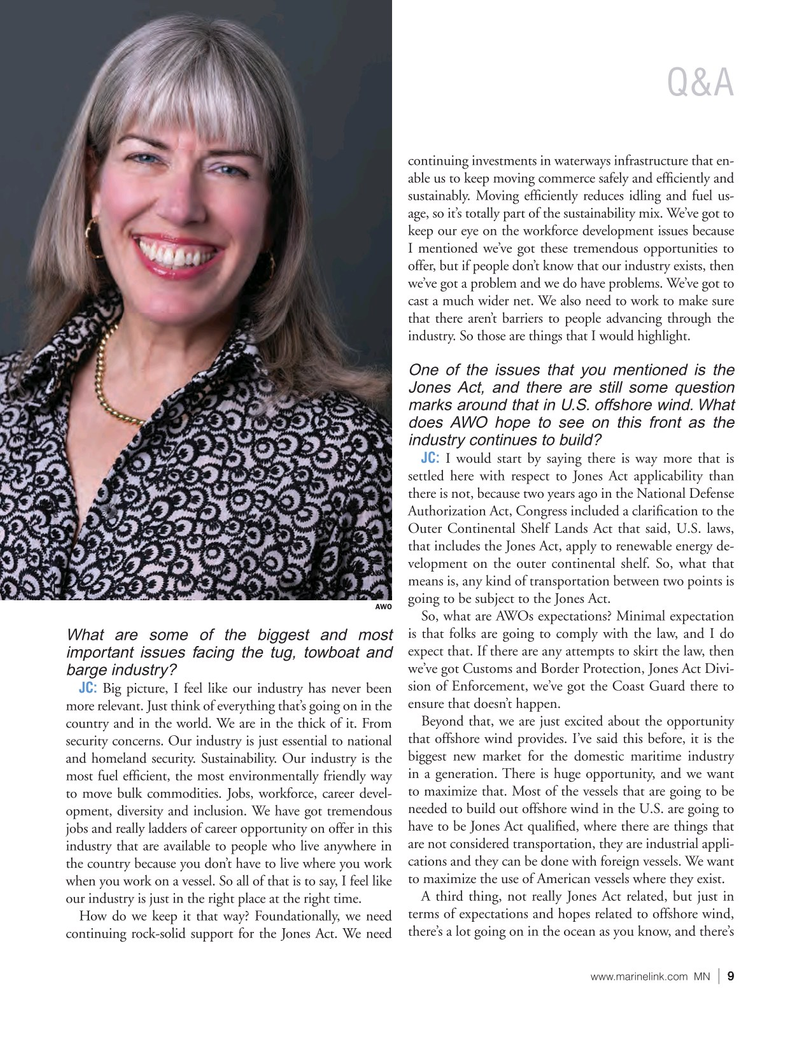
Page 9: of Marine News Magazine (April 2023)
Towboats, Tugs & Barges
Read this page in Pdf, Flash or Html5 edition of April 2023 Marine News Magazine
Q&A continuing investments in waterways infrastructure that en- able us to keep moving commerce safely and ef? ciently and sustainably. Moving ef? ciently reduces idling and fuel us- age, so it’s totally part of the sustainability mix. We’ve got to keep our eye on the workforce development issues because
I mentioned we’ve got these tremendous opportunities to offer, but if people don’t know that our industry exists, then we’ve got a problem and we do have problems. We’ve got to cast a much wider net. We also need to work to make sure that there aren’t barriers to people advancing through the industry. So those are things that I would highlight.
One of the issues that you mentioned is the
Jones Act, and there are still some question marks around that in U.S. offshore wind. What does AWO hope to see on this front as the industry continues to build?
JC: I would start by saying there is way more that is settled here with respect to Jones Act applicability than there is not, because two years ago in the National Defense
Authorization Act, Congress included a clari? cation to the
Outer Continental Shelf Lands Act that said, U.S. laws, that includes the Jones Act, apply to renewable energy de- velopment on the outer continental shelf. So, what that means is, any kind of transportation between two points is going to be subject to the Jones Act.
AWO
So, what are AWOs expectations? Minimal expectation is that folks are going to comply with the law, and I do
What are some of the biggest and most expect that. If there are any attempts to skirt the law, then important issues facing the tug, towboat and we’ve got Customs and Border Protection, Jones Act Divi- barge industry?
JC: Big picture, I feel like our industry has never been sion of Enforcement, we’ve got the Coast Guard there to more relevant. Just think of everything that’s going on in the ensure that doesn’t happen.
Beyond that, we are just excited about the opportunity country and in the world. We are in the thick of it. From security concerns. Our industry is just essential to national that offshore wind provides. I’ve said this before, it is the and homeland security. Sustainability. Our industry is the biggest new market for the domestic maritime industry most fuel ef? cient, the most environmentally friendly way in a generation. There is huge opportunity, and we want to maximize that. Most of the vessels that are going to be to move bulk commodities. Jobs, workforce, career devel- opment, diversity and inclusion. We have got tremendous needed to build out offshore wind in the U.S. are going to jobs and really ladders of career opportunity on offer in this have to be Jones Act quali? ed, where there are things that industry that are available to people who live anywhere in are not considered transportation, they are industrial appli- the country because you don’t have to live where you work cations and they can be done with foreign vessels. We want when you work on a vessel. So all of that is to say, I feel like to maximize the use of American vessels where they exist.
A third thing, not really Jones Act related, but just in our industry is just in the right place at the right time.
How do we keep it that way? Foundationally, we need terms of expectations and hopes related to offshore wind, continuing rock-solid support for the Jones Act. We need there’s a lot going on in the ocean as you know, and there’s www.marinelink.com MN 9|

 8
8

 10
10
